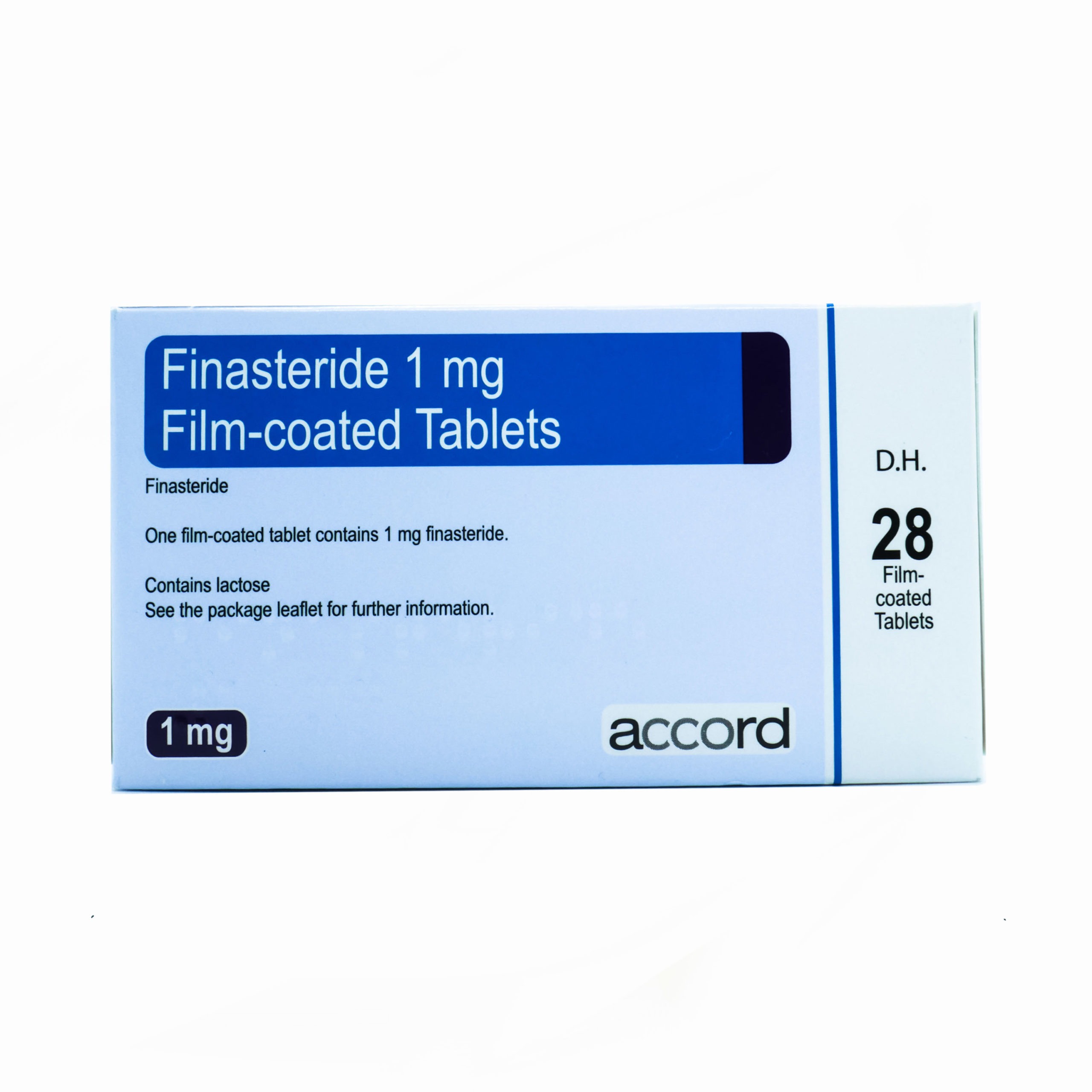Finasteride
-

Fast Delivery
Fast, tracked delivery through Royal Mail. Arrives as quickly as the next working day.
-

100% UK-based pharmacy
Our team of doctors and prescribers, and our support staff, are all UK-based.
-

Free support and advice
We're on hand to offer free support and advice by email and telephone (Mon - Fri 09:00 - 17:00).
-

Discretion is guaranteed
All our packages are discreet; your privacy is of utmost importance to us.
Description
What is Finasteride?
Finasteride 1mg tablets, also available under the generic name Propecia, offer an affordable solution for men in the UK battling hair loss and male pattern baldness, technically known as androgenetic alopecia. This cost-effective alternative to more expensive branded hair loss treatments shares the same active ingredient, finasteride, renowned for its effectiveness. Designed for oral intake, clinical research demonstrates finasteride's impressive success rate—up to 90% in slowing hair loss and promoting hair regrowth in men. However, it's important to note that finasteride is intended solely for male use and acts as a treatment rather than a cure for baldness, necessitating ongoing usage to maintain its benefits.
How Does Finasteride Work?
Finasteride's mechanism of action lies in its ability to inhibit the conversion of testosterone into dihydrotestosterone (DHT), a hormone known to shrink hair follicles and lead to hair loss. By blocking the enzyme responsible for this conversion, finasteride effectively pauses hair loss and allows for the potential recovery and regrowth of hair follicles.
It's crucial to understand that finasteride requires patience and commitment, typically showing noticeable improvements within 3-6 months of consistent daily use. Stopping the medication can reverse its positive effects. Being a prescription-only medication, it's essential to consult a healthcare professional to ensure proper diagnosis and to discuss any possible side effects before commencing treatment.
How Effective Is Finasteride?
Finasteride has been extensively studied for its efficacy in treating male pattern baldness, specifically in men aged 18-41 experiencing mild to moderate hair loss. The findings from these studies reveal that taking 1mg of Finasteride daily can lead to noticeable improvements in hair growth within a span of 4 to 6 months. Moreover, the maximum benefits of Finasteride usage are typically observed after 1 to 2 years of consistent treatment.
Long-term studies indicate that men who continue Finasteride treatment for up to 5 years have a 90% likelihood of maintaining or increasing the hair count from when they started the medication. This is a significant contrast to the 25% chance of maintaining hair count in men who do not use Finasteride.
Warnings
Finasteride Warnings
Important Safety Information for Finasteride Users
Prescription Guidelines
Finasteride is a medication primarily prescribed for male pattern hair loss. However, it's essential to note that this medication is not available on prescription from the National Health Service (NHS) for hair loss purposes.
Precautions for Women
Finasteride is strictly not recommended for use by pregnant women or those who might become pregnant. The reason is, that if the medication comes into contact with the skin of a pregnant woman, it has the potential to cause birth defects in male fetuses.
Blood Donation Advisory
Individuals undergoing Finasteride treatment are advised against donating blood during the treatment period and for at least four weeks after concluding the treatment. This precaution is to prevent the risk of exposing pregnant women to the medication through transfusion, which could adversely affect male fetal development.
Impact on Prostate Screening Tests
Finasteride may alter the results of blood tests that measure prostate-specific antigen (PSA) levels. Patients should inform their healthcare providers of their Finasteride use when undergoing PSA screenings.
Breast Cancer Risk
There have been reports of men developing breast cancer while on Finasteride. Any new breast lumps, pain, discharge, or other changes should be promptly reported to a healthcare professional.
Symptoms Requiring Immediate Attention
Consult your doctor if you experience symptoms such as nipple discharge, unusual fatigue, fever, patchy or clumpy hair loss, scalp inflammation, persistent diarrhoea, rapid hair loss, or unexplained weight loss.
Causes of Hair Loss in Men
Male pattern baldness, scientifically known as androgenetic alopecia, is primarily caused by the hormone dihydrotestosterone (DHT). DHT is a byproduct of testosterone and is responsible for shrinking hair follicles, leading to hair loss. Symptoms of hair loss can vary and include slower hair regrowth, a receding hairline, and thinning hair, potentially leading to complete baldness or a horseshoe-shaped pattern of hair around the head.
Alternative Hair Loss Treatments
Avodart (Dutasteride)
Similar to Finasteride, Avodart is another medication initially approved for treating enlarged prostates but has shown efficacy in treating male pattern baldness off-label. Reviews for both medications are generally favourable.
Regaine (Minoxidil 5%)
Regaine, available as a lotion or foam, is an over-the-counter option for hair loss treatment. It can be used alone or alongside Finasteride or Avodart and is the only non-prescription treatment proven effective.
Other Options
While hair loss surgery is an alternative, it's expensive and results vary. Non-surgical treatments are deemed safer. Caution is advised when considering unverified hair growth products from online or high-street sources due to safety and efficacy concerns.
Directions
Does Finasteride Work For All Men?
The effectiveness of Finasteride in preventing hair loss has been well-documented through clinical research. In a notable study involving nearly 6,000 men between the ages of 18 and 41, results showed that 9 out of 10 participants benefited from Finasteride, with 90% experiencing a cessation in hair loss and 77% observing an increase in hair growth. It's important to start Finasteride treatment early in the hair loss process for optimal results, as it does not regenerate lost hair follicles but can prevent further hair loss and preserve existing hair.
Combining Finasteride with Other Hair Loss Treatments
While Finasteride is effective on its own, it can also be used in conjunction with other hair loss treatments for potentially enhanced results. Although the combined efficacy of Finasteride with treatments like Regaine (minoxidil) has mixed clinical support, it's a common practice. However, it's advised not to combine Finasteride with other oral hair loss treatments or supplements without consulting a healthcare provider. This approach allows for a comprehensive treatment plan that addresses hair loss from multiple angles.
Optimizing Your Finasteride Treatment
Embarking on a Finasteride regimen requires understanding its proper usage to ensure effectiveness. Below is a detailed guide on how to maximize your treatment with Finasteride:
Effective Usage Guidelines
-
Consistency is Key: Take one tablet of Finasteride daily. For best results, consume the tablet at the same time each day.
-
With or Without Food: Finasteride can be taken on an empty stomach or with meals, depending on your preference.
-
Continuous Treatment: For Finasteride to work effectively, it must be taken regularly, as skipping doses can impact its effectiveness.
-
Missed Doses: If you miss a dose, proceed with the next dose as scheduled. Do not double up to compensate for the missed dose.
-
Dosage Limit: Adhere to the prescribed dosage; increasing the dose will not enhance the treatment's effectiveness and is not advisable.
Duration of Treatment
-
Results typically become noticeable within 3 to 6 months of starting treatment. Finasteride is a long-term solution for hair loss prevention and can be used safely over several years.
-
Discontinuation should only be considered in consultation with your healthcare provider, as ceasing treatment may reverse the benefits gained.
Ingredients
Finasteride Ingredients
-
Active Ingredient: Each tablet contains 1mg of Finasteride.
-
Inactive Ingredients: May include lactose monohydrate, microcrystalline cellulose, pregelatinized starch, lauroyl macrogolglycerides, sodium starch glycolate–Type A, magnesium stearate, hypromellose, titanium dioxide (E171), yellow and red iron oxide (E172), and macrogol 6000.
Side Effects
Side Effects of Finasteride
Potential Side Effects
While most individuals tolerate Finasteride well, it's important to be aware of potential side effects, which vary among users:
-
Uncommon (1-10 in 1000 people): Decreased sex drive, depression, ejaculation disorders, impotence.
-
Rare: Hypersensitivity reactions (hives, itching, rash, facial swelling), palpitations, tender/swollen breasts, testicular pain.
Key Points to Remember
-
Side effects typically improve over time and are most common within the first year of treatment.
-
Continued erectile dysfunction or diminished libido after stopping Finasteride has been reported but is not common.
-
A review by NHS Choices in March 2017 concluded that nearly all sexual function issues were resolved after discontinuing Finasteride.
-
There have been instances of Finasteride being linked to suicidal thoughts in some cases.


